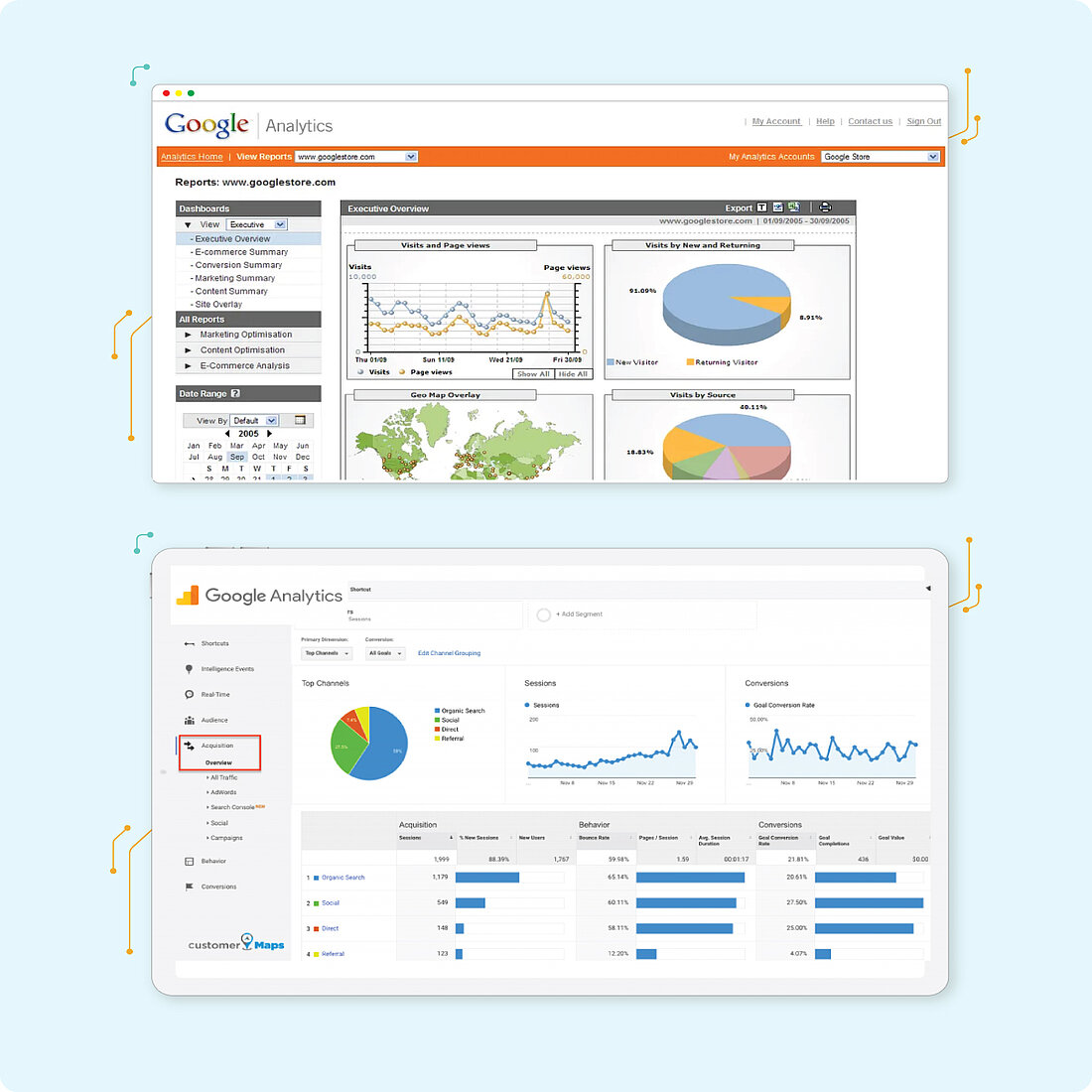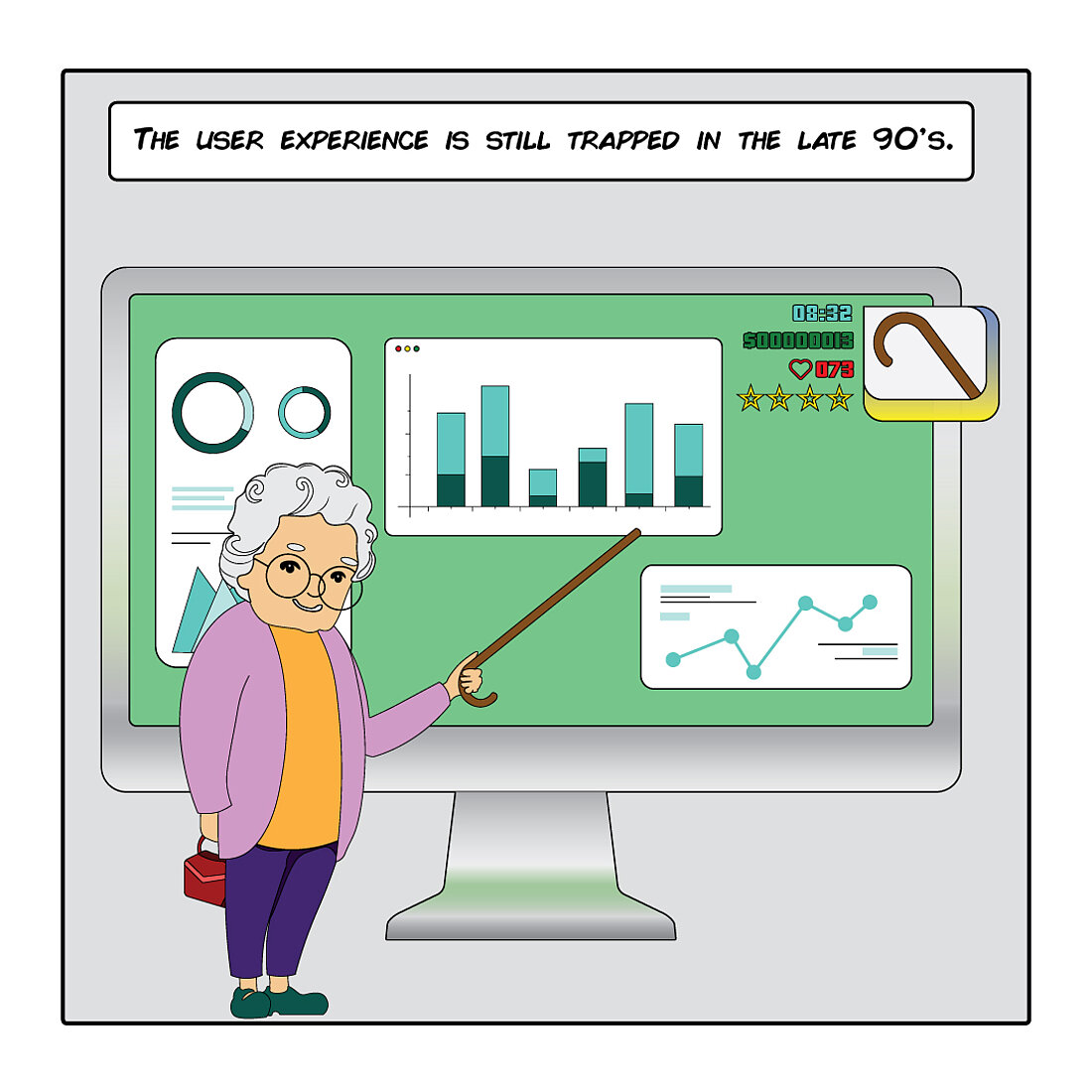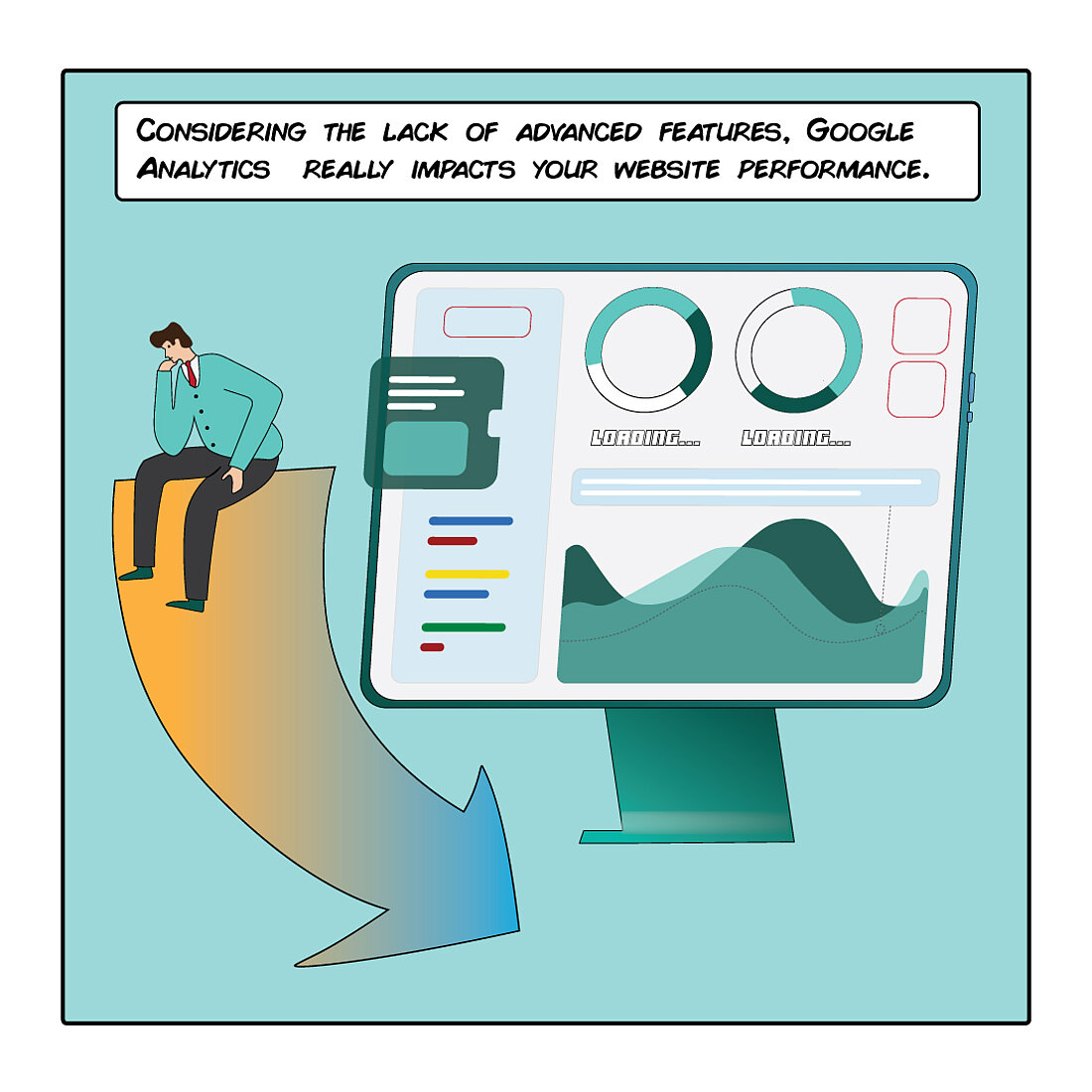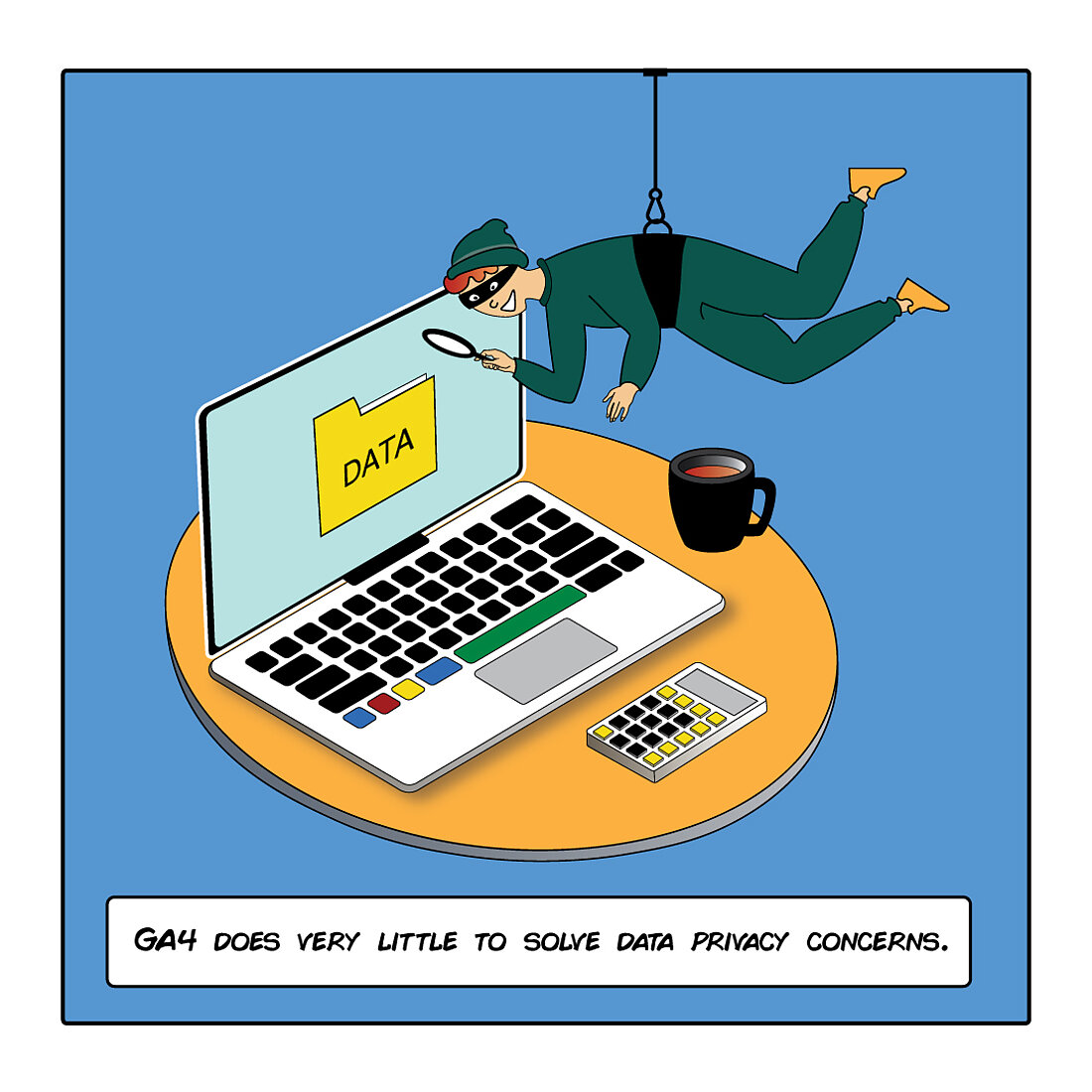
Simon Coulthard August 29, 2022

Uh Oh! Pigs might fly and Niko Bellic might carjack a station wagon - Google Analytics 4 (GA4) is making marketers unhappy. They’ve taken to Twitter to voice their unhappiness about it, with the general consensus summed up by one user who said - “Why GA4, Why??!!”
The arrival of GA4 is as big an event for the marketing community as any new Rockstar game is to its legion of loyal fans, given the lion’s share that Google has of the website analytics sector. So, we turned on emergency sirens and set out in a mission to find out the most killer Google Analytics 4 review.

Launched in 2021, it represents the biggest overhaul of Google Analytics platform since the first iteration was released back in 2005.

For those dewy-eyed nostalgics amongst us, here’s how GA4 looks compared with the original version:
Given their sheer wealth and influence, GA4 should really be the rockstar of the website analytics industry for years to come. But unfortunately, this is about as likely as GTA becoming a family-friendly game - marketers just don’t like the new version.
And, while it's certainly true that we’re all naturally resistant to change, this doesn’t explain the level of vitriol that swirling around GA4. After all, modern marketers are literally drowning in technology, making the adoption of new software a prerequisite for the job.
So, let’s listen to the wind and face facts - GA4 is pretty awful by most accounts, and the mission of this article is to run through the issues that marketers have with this website analytics tool, and to shoehorn as many GTA references in as we can think of (we’ve got a Playstation 5 in the chill out room). Let's take a look at the disadvantages of Google Analytics 4 from marketers' perspective.

User Experience is Trapped in the 90s
The 90s was a fun time for technology.
The internet barely existed, beepers were a style-at-work staple, and Grand Theft Auto was still a top-down 2D game as the decade fizzled out.
Computers were slow and cumbersome, and the user experience was positively Wild Western by today’s standards - think cowboys with pulleys and levers, and oxen on treadmills.
You’d have thought that Google would have perfected the user experience for its analytics platform by now, but it’s still very much stuck in this bygone decade.
The main gripe that marketers have with GA4 is that the new user interface is unintuitive, difficult to use, and much harder to navigate than its predecessor - it’s like playing GTA with a broken gamepad.
It’s also less customizable, and the new layout makes it all-to-easy to miss when features have been released or updated.
What’s more, many of the commonly used features are buried so deep that multiple users wonder if Google has deliberately made them as difficult to find as the UFOs in GTA 5.
The important data is also really difficult to access, and getting what you want out of it is hard enough for seasoned SEO professionals (shout out to Sorin, our go-to guy at TWIPLA), but normal business owners without a high level of tech-spertize will find it, well, frustrating to say the least.
This looks like an almost criminal oversight, and many wonder whether Google has designed it to only cater to larger websites and companies.

Google Analytics 4 Impacts Website Performance
Google Analytics 4 remains a simple website analytics tool, meaning that it lacks all the visitor behavior and communication tools that you find in many alternatives - Google has basically just released Grand Theft Auto 2(D), when players have already become used to the 3D open-world platforms created by their competitors.
And despite being so limited, Google’s script size is MASSIVE compared to other analytics platforms - 45.7KB for the full package, or 10KB for the limited option.
So, while all website analytics software will slow down your website slightly, the large size of Google Analytics 4’s script means that it has much more of an impact.
Together with the three added HTTP requests, this works to slow down page loading times and lowers the SEO score - meaning that Google is effectively punishing marketers for using their product.
These regulations are also a fairly tricky thing to understand - though we’ve got your data privacy back - and this work is another time-consuming task that steals you away from your mission.
What’s more, 95% of internet users either decline these cookies, or regularly delete their cache (SERNAC).
This obviously works to reduce the amount of data you are able to collect considerably, as well as the accuracy of your insights - would you usually consider making key strategic decisions with just 5% of the information at hand?

Google Analytics 4 is Banned Across the EU
Google Analytics 4’s use of first person cookies means that marketers have more to worry about than never-ending data privacy requirements, or the annoyance of internet users forced to continue navigating down endless consent banner highways.
Simply put, the EU has banned GA4 across its territories due to privacy concerns that do not meet GDPR requirements.
GA4 stores data on US-based servers, meaning that Google must comply with US surveillance laws and provide the government with access to this personal data as and when they demand it - placing the personal data of EU citizens at risk.
This decision has also been upheld by domestic court decisions in Austria, Holland, Italy, and France, with other countries considering similar action.
As a result of this, using GA4 means that you are increasing your company’s wanted level when people are browsing from within EU countries - putting pretty much every digital business in the world at risk.

GA4 is a Poor Upgrade on Universal Analytics
These privacy issues are a damning indictment of where Google’s head is with website analytics - their priority is turning data into yachts for their shareholders (it’s quite the cheat mode).
However, even if you ignore their criminal record, the rest of the platform just isn’t worth the jail time - even when compared to its predecessor, Universal Analytics.
Firstly, Google Analytics (GA4) has done away the sessions, page views, conversion rates, and so forth that marketers are familiar with. Some people won’t have a problem with events-based analytics, but most will be frustrated that they have to learn how to do website analytics from scratch.
Google has also made conversion tracking much harder - a strange move considering how important conversion rates are to the success of any business website. You might as well try to go to war with a rival gang, while leaving your fiercest enforcers at home.
Users are also unhappy that the number of acquisition reports has nosedived from 30 in Universal Analytics to just three in GA4.
Custom dimensions are now limited to 50, while you cannot analyze data that is more than 14 months old - a situation that’s far from ideal given the many vital insights that can be garnered by comparing current data with historic campaigns.
Google has also removed many of the features that marketers have long relied on, such as multi-channel funnels and data-driven attribution. Date filtering has also taken a hit, with users no longer able to use hostname filtering to remove most referral spam from their datasets.
There are now also fresh restrictions on IP filtering, with users noting new restrictions on the number of blockable IP addresses. This is particularly frustrating since GA4 doesn’t support Regular Expression, a powerful tool in digital marketing for extracting specific pieces of useful information from large data sets. There's no way out - too many cons of Google Analytics 4!

Turn to a Privacy-Perfect Alternative
Given the very public telling off that Google has received from the EU over its poor protection of personal data, it’s slightly baffling how much of a hold they have over the website analytics market.
This is particularly so given the number of strong alternative website analytics platforms that won’t affect your GDPR compliance thanks to cookieless tracking technology.
And, since Google is going to pull the cord on Universal Analytics in July 2023, users will have to switch over to GA4 (and lose their historic data unless they’re careful).
Time is ticking, and this makes it a good moment to take stock of your website analytics options, and TWIPLA is one to add to the list - consider it to be a GA4 plus plus.
It provides far more website performance statistics than its distant Goolge cousin, while also offering some pretty cool visitor behavior features and communication tools.
It’s also privacy perfect straight out of the box, so that’s good. Become a marketing rockstar - get practicing with TWIPLA.
And if you liked this article, be a pal and share it around with your marketing friends!
Share article
Get Started for Free
Gain World-Class Insights & Offer Innovative Privacy & Security


Stay Updated & Get Inbox Insights
Keep pace with the world of privacy-first analytics with a monthly round-up of news, advices and updates!











